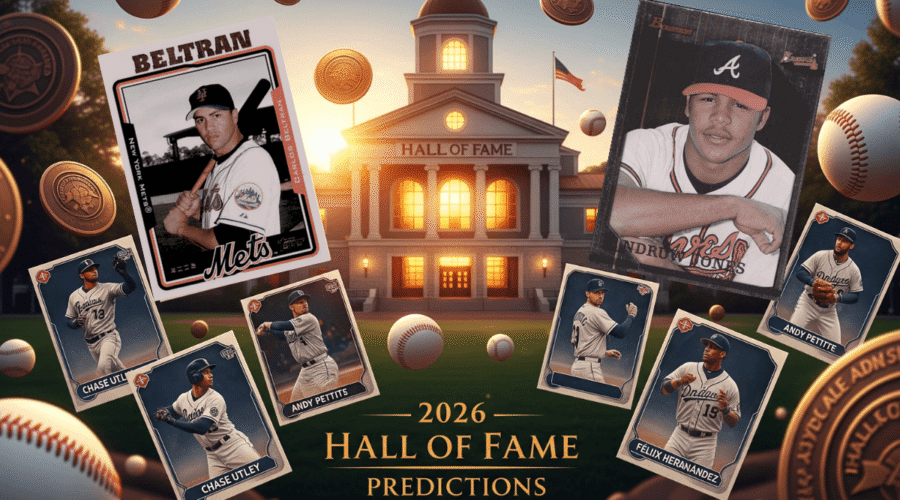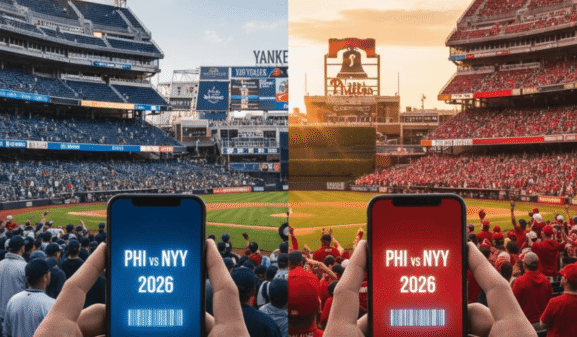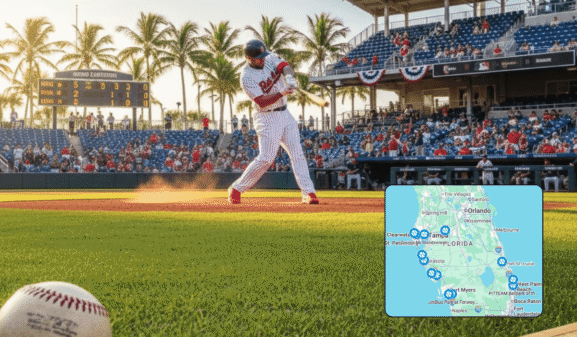2026 MLB Hall of Fame Ballot: Predictions and Rumors as Baseball’s Elite Chase Cooperstown Glory
With the dust settling on the 2025 Baseball Hall of Fame induction ceremony that celebrated Ichiro Suzuki, CC Sabathia, and Billy Wagner, attention now turns to the 2026 ballot—and the predictions and rumors surrounding which players might finally reach baseball’s ultimate honor. The upcoming election presents a fascinating landscape where returning candidates hold the spotlight over a relatively weak class of first-time nominees.
The Clear Frontrunners: Two Players Destined for Cooperstown
Carlos Beltrán emerges as the overwhelming favorite heading into 2026, having achieved a remarkable 70.3% of the vote in 2025, representing a +13.2 point increase from 2024. The nine-time All-Star and member of baseball’s exclusive 400 home run-300 stolen base club now sits just 17 votes shy of the 75% threshold needed for induction. Historical precedent strongly favors his election—no player who has reached 70% support has failed to eventually gain entry to Cooperstown.
Despite lingering concerns about his involvement in the 2017 Houston Astros sign-stealing scandal, Beltrán’s trajectory suggests growing voter appreciation of his case, which includes 435 home runs, 312 stolen bases, nine All-Star selections, a Rookie of the Year Award and three Gold Glove Awards. His traditional credentials combined with postseason heroics make him a near-lock for induction, with predictions pointing to his name being called in January 2026.
Andruw Jones represents the second-strongest candidate after climbing to 66.2% in 2025, a +4.6 point increase from 2024. The former Atlanta Braves center fielder, widely considered one of the greatest defensive players in baseball history, won 10 consecutive Gold Glove Awards—more than all but Willie Mays and Roberto Clemente. His 434 career home runs combined with elite up-the-middle defense create a compelling Hall of Fame case, though he’s running out of time with only two years remaining on his ballot.
Rumors suggest Jones faces a more competitive race against time, but momentum is building toward his potential final opportunity. If he doesn’t cross the threshold in 2026, he should be positioned to follow Billy Wagner’s lead as a final-ballot selection in 2027.
Read more: MLB 2026 Schedule Release Date: Predictions and Rumors Surrounding the Delayed Announcement
Rising Contenders Building Momentum
Chase Utley made significant strides in 2025, jumping to 39.8% of the vote, an +11.0% increase that signals growing support among voters. The six-time All-Star second baseman’s analytics-friendly profile—reaching 64.5 career WAR, including an average of 7.6 per season from 2005-10—is resonating with younger voters despite his modest counting stats. His trajectory mirrors other eventual inductees who gained momentum after overcoming initial resistance, with predictions suggesting he could challenge the 50% mark in his third year.
Andy Pettitte experienced a remarkable surge in 2025, rising to 27.9%, a massive +14.4% increase after showing little progress in his first six years. The five-time World Series champion’s 256 regular-season wins and record 19 postseason victories are gaining recognition as voters reassess his credentials. With only three years remaining on his ballot, Pettitte’s late-career momentum resembles Larry Walker’s path to induction, though he remains far from the 75% threshold.
Félix Hernández debuted with 20.6% of the vote in 2025, positioning him well for future growth. The 2010 Cy Young Award winner’s impressive debut percentage compares favorably to recent Hall of Famers who gradually won over voters. His perfect game in 2012 and franchise records with Seattle provide additional narrative support, though his 49.9 career WAR and lack of postseason experience present challenges.
The New Faces: A Weak First-Time Class
The 2026 ballot lacks star power among newcomers, with Cole Hamels leading the first-time candidates. The four-time All-Star left-hander posted a 163-122 record with a 3.43 ERA and 2,560 strikeouts over his 15-year career. His World Series and NLCS MVP performances in 2008, combined with his 2015 no-hitter, provide narrative support for his candidacy. However, predictions suggest Hamels will receive modest support initially, likely staying on the ballot but not threatening the 75% threshold in his debut year.
Ryan Braun presents one of the more controversial first-time cases. The 2007 Rookie of the Year and 2011 National League MVP accumulated impressive numbers: a .296 batting average, 352 home runs, and 1,963 hits. However, his 2013 PED suspension significantly damages his Hall of Fame prospects, with rumors suggesting his connection to performance-enhancing drugs will limit voter support despite surviving the 5% threshold needed to return.
Other notable first-time candidates include Edwin Encarnación (424 home runs), Shin-Soo Choo (.377 career on-base percentage), Alex Gordon (eight Gold Gloves), Matt Kemp, Hunter Pence, and Nick Markakis, though predictions suggest none will gain significant traction in their initial year.
Read more: Dodgers 2026 Schedule Release Date Predictions and Rumors: Your Ultimate Guide
The Longshots and Final Chances
Manny Ramírez enters his final year of eligibility at 34.3%, having gained only modest support over his nine years on the ballot. The 12-time All-Star’s 555 career home runs and offensive dominance are overshadowed by multiple PED suspensions, with predictions pointing to his falling off the ballot and relegation to future Era Committee consideration.
Alex Rodriguez continues to stagnate at 37.1%, with his multiple PED violations preventing serious consideration despite his 696 home runs and three MVP awards. Rumors suggest the BBWAA simply isn’t ready to induct post-suspension-era players, particularly repeat offenders.
Among deeper candidates, Bobby Abreu (19.5%), Jimmy Rollins (18%), and Mark Buehrle (11.4%) face uphill battles as time runs short on their candidacies, though the cleared ballot may provide opportunities for modest gains.
Expert Predictions and Analysis for 2026
The relatively weak first-time class creates opportunities for returning candidates to gain ground. Baseball analysts predict Carlos Beltrán will finally be inducted in 2026, benefiting from the cleared ballot and increased attention. Andruw Jones faces a more competitive race against time but has momentum building toward his potential breakthrough.
Predictions suggest Cole Hamels will comfortably remain on the ballot but won’t threaten induction in his first year. Ryan Braun’s PED connection will likely limit his support, though he may survive the 5% threshold needed to return in 2027.
Rumors surrounding voter sentiment suggest a shift toward analytics-friendly candidates like Utley and Hernández, who benefit from advanced metrics that weren’t emphasized in previous voting cycles. Meanwhile, traditional candidates face increasing scrutiny as younger voters join the electorate.
The 2026 election promises to be pivotal for several deserving candidates, with predictions favoring Beltrán for induction while setting up intriguing storylines for future ballots. Industry insiders suggest this could be one of the more controversial Hall of Fame ceremonies in recent years, especially given the contrast with the universally celebrated 2025 class.
Read more: MLB Top 100 Prospects 2025: Complete Rankings and Analysis
Looking Ahead: What the Future Holds
Baseball’s Hall of Fame voting landscape continues evolving, with advanced analytics playing an increasingly important role in how voters evaluate candidates. The 2026 predictions reflect this shift, as players with impressive peak values but modest counting stats find growing support among the electorate.
The rumors and speculation surrounding next year’s ballot suggest we’re witnessing a changing of the guard in Hall of Fame voting patterns. Traditional benchmarks are being reconsidered as the game itself evolves, potentially opening doors for candidates who might have struggled in previous eras.
Frequently Asked Questions
Q: When will the 2026 Hall of Fame results be announced?
A: The Baseball Writers’ Association of America will announce the 2026 Hall of Fame election results in January 2026, with the induction ceremony scheduled for July 2026.
Q: How many votes does a player need to be elected?
A: Players need 75% of the vote from eligible BBWAA members to be elected. They must receive at least 5% to remain on the ballot for the following year.
Q: Why isn’t Ryan Braun considered a strong candidate despite his MVP award?
A: Braun’s 2013 PED suspension significantly damages his candidacy, similar to other players connected to performance-enhancing drugs. His relatively short career and advanced metrics also fall below typical Hall of Fame standards.
Q: Could any first-time candidates be elected in 2026?
A: It’s highly unlikely. Cole Hamels has the strongest case among newcomers, but he lacks the overwhelming credentials typically required for first-ballot election. The weak first-time class actually benefits returning candidates like Beltrán and Jones.
Q: What happens if Andruw Jones doesn’t get elected in 2026?
A: Jones would have one final chance in 2027, his 10th and final year of BBWAA eligibility. If unsuccessful, he could be considered by a future Era Committee for potential induction.
Q: How has voter sentiment changed in recent Hall of Fame elections?
A: There’s been a growing appreciation for advanced analytics and peak value over traditional counting stats. Younger voters are also more willing to reconsider candidates who may have been o


